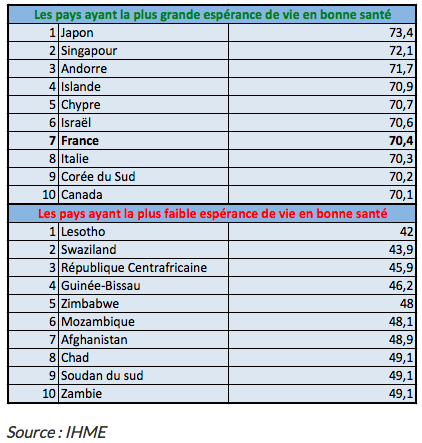A child born in 2013 will live on average 6.2 years longer than his eldest child in 1990. His healthy life expectancy will increase by 5.4 years.

As longevity gains level off, these positive results may be the last of their kind. Published in the British medical journal The Lancet (and relayed by Reuters), a study conducted by scientists at the University of Washington reveals that life expectancy for both sexes globally has increased significantly in recent years.
In figures, from 6.2 years between 1990 and 2013, going from 65.3 years to 71.5 years, even in some of the poorest countries in the world. “The progress made in the fight against certain infectious diseases such as AIDS and malaria, but also in the treatment of childhood diseases, has contributed to the improvement of the health of human beings”, explains Theo Vos, principal author of the ‘study.
Healthy life expectancy increases
More encouragingly, life expectancy in good health has also increased by 5.4 years during the same period, from 56.9 years to 62.3 years. This is calculated by taking into account both mortality and the incidence of non-fatal conditions or chronic diseases such as heart and lung disease, diabetes and serious injuries, which decrease the quality of life and require serious injuries. heavy charges, especially financial.
“Heart disease, lower respiratory tract infection and stroke are the main causes of deteriorating health around the world,” said the study.
The indestructible Japan
For most of the 188 countries studied, scientists therefore consider the change in life expectancy in good health between 1990 and 2013 to be “significant and positive”. However, even if the overall trend is upward, there are strong disparities between countries.
In Belize, Botswana and Syria, for example, healthy life expectancy was not much different in 2013 from what it was in 1990. In other countries – South Africa, Belarus, Paraguay – , this indicator has simply dropped. Finally, in Lesotho and Swaziland, people born in 2013 could expect to live ten healthy years less than those born twenty years earlier.
Thus, in this 2013 ranking, it is Japan that tops the list of countries with the highest healthy life expectancy (73.4 years). The Land of the Rising Sun also holds the record for the place where the greatest number of centenarians lives.
France’s good results
France, for its part, is ranked 7th in the world. In our country, life expectancy increased by more than five years for men and almost four years for women between 1990 and 2013. It was 73.04 years for the first and 81.21 years. for the second in 1990. It is now 78.38 years and 84.91 years, respectively.
Life expectancy in good health has also increased. During the same period, it went from 64 to 68.43 for men and from 69.64 to 72.32 for women.
The French women hold the third world record in this respect, after Andorra and Qatar. On the men’s side, the French now live to age 78. They only arrive in 21st position in the ranking, according to another study, also published in The Lancet.
Conversely, Lesotho, landlocked within South Africa, was the country with the lowest life expectancy (42 years, some 31 years less than in Japan), behind Swaziland , Central African Republic, Guinea-Bissau, Zimbabwe, Mozambique, Afghanistan, Chad, South Sudan and Zambia.















